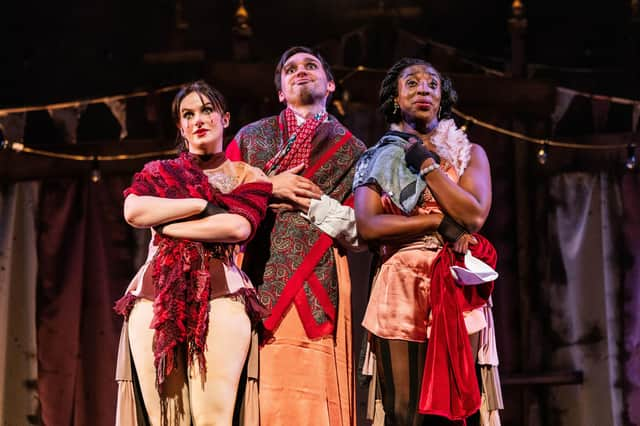Eastbourne: Oh What a Lovely War - "a memorable production of a truly landmark musical"


An evening of history, and a slice of theatre history: Oh What a Lovely War is touring again, and at the Devonshire Park this week, the Blackeyed Theatre company has moved, shaken and superbly entertained its audiences. When in 1963 Joan Littlewood and her Theatre Workshop created this work, they were breaking new ground. Not the classic but stylised offerings of a Noel Coward. Nor the portentous heavyweight stuff of a Shaw or an Ibsen. But a collective of all the talents, a work and a production that must have grown organically. Provocative, achingly human, wryly humorous and yet piercingly tragic. And its impact is just as forceful, all these years and decades on.
The dialogue, swift and sharp and lethal as a bayonet’s blade, is often delivered at pace and with stinging, ironic humour: it reflects the grim fatalism of men in trenches. Young men, nearly all conscripts with no choice but to follow orders – even when those High Command orders mean the horrible deaths of thousands. The First World War had been the culmination of a diplomatic stalemate, as European nations played out their imperialist ambitions like a board game. Move two squares, knock out an enemy artillery position, retreat three squares. Nationalist pride and blind belligerence – but with real guns and shells and corpses. Chauvinism galloping into the Gates of Hell.
Advertisement
Hide AdAdvertisement
Hide AdBlackeyed Theatre’s Oh What a Lovely War has that astonishing capacity to entertain – albeit through ghastly vivid images and mesmerising snatches of action – and yet to leave its audience shaken to the core. You cannot watch this production and not be moved.
If you haven’t booked your tickets yet, this is a show to watch from close up. Your reviewer enjoyed Act One from the rather detached distance of the dress circle; but sneaking into Row C of the stalls gave the performance an intimacy and involvement that really hits home.
Six actors in search of a character? Each of these performers must cover a couple of dozen roles, in a swirl of costume and prop changes and an equally skilful switch of location, accent, nationality minute by minute. Occasionally, but only occasionally, the audience finds itself scrambling to catch up – but that is actually part of the fun. The stagecraft is brilliant and the versatility of the performers is marvellous.
Tellingly, a glance at the programme reveals that five of the six – quite youthful – company trained at Rose Bruford, the drama college which has virtually patented the “muso” variant: the actor-musicians who can act, move and do everything with a whole clutch of instruments. Locally educated Chioma Uma (see interview here) was at school at the now-lamented Moira House, while the other female in the company, Alice E Mayer, played the Devonshire Park last year in a touring Frankenstein. The four gentlemen of the cast - and it’s invidious to separate them – cover a huge range of roles from politicians to generals to lance-corporals. Not a misplaced accent, either, as Russians meet Germans meet Frenchmen. Wonderful stuff from Christopher Arkeston, Tom Crabtree, Harry Curley and Euan Wilson.
Advertisement
Hide AdAdvertisement
Hide AdAs for the creatives, Nicky Allpress directs with tightness and pace, and makes full use of the space created by Victoria Spearing’s set design – beautifully flexible although the over-arching setting, a bit like a cellar-bar folk club, feels just a bit claustrophobic at times. But any comparison with Brighton Pier – the setting for Attenborough’s classic film production – is plain unfair, and the interior concept certainly works.
It’s expertly lit, too, by Alan Valentine’s atmospheric lighting design, turning field ambulances into cavalry charges. And as one wartime song after another tumbles out, half-remembered and so evocative, that bond with the audience is ever tighter.
The Wednesday performances hosted a number of school parties, and there’s an argument – if not a school budget! – for bringing every Key Stage Four student in the land to witness this living, breathing, aching piece of Europe’s history. My subject is War and the pity of War, wrote Wilfred Owen: the poetry is in the pity. Here at the Devonshire Park Theatre, the poetry and the pity are in the performance. A memorable production of a truly landmark musical.
Review by Kevin Anderson